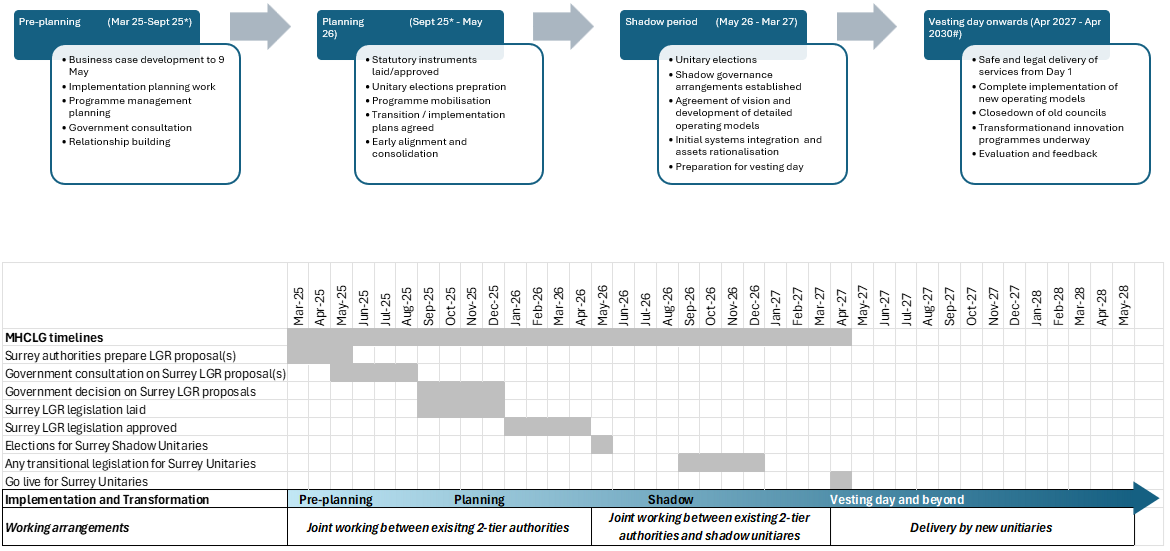Timeline

Working arrangements, decision making and governance
The implementation of our proposal will require close collaborative working between local authorities in Surrey. This will happen first on an informal basis, transitioning to formalised ways of working in the run up to and during the shadow period, with unitary authorities taking on full responsibility for concluding implementation and progressing transformation activity from Vesting Day onwards.
Programme management arrangements
A robust approach to programme management will be essential throughout the planning and implementation stages, incorporating support for transformation activities where necessary.
To plan for the transition, a single programme management office (PMO) will be established, bringing together in house expertise as well as additional dedicated programme management resource to be funded from government capacity funding and contributions from all councils. This will ensure appropriate oversight across upper-tier and lower-tier authorities, addressing considerations associated with the formation of the new councils, disaggregation of upper-tier services across the area (when and where applicable), and aggregation of lower-tier services to the new geographies.
Multi-disciplinary delivery teams will come from across the councils, supported by in house and additional dedicated programme management resource to be funded from government capacity funding and contributions from all councils. The PMO will provide structure and coherence to planning, governance and delivery activities across the range of thematic workstreams delivered by multi-disciplinary teams assembled from across the councils. The PMO team will lead, facilitate, support and monitor delivery of target operating models for each new authority, providing regular updates and exception reporting as part of effective programme governance.
Governance and decision-making structures
Internal governance structures will ensure a robust approach to programme delivery and provide oversight and assurance. These structures will build on current informal joint working arrangements, and existing formal decision-making processes. We will take the opportunity to formalise arrangements for joint decision making as soon as possible in the transition process.
Culture change in the transition
Establishing new unitary authorities will require more than structural and operational change - it will demand a deliberate and sustained cultural transformation across the entire local government workforce and leadership in Surrey. The formation of three new councils presents a critical opportunity to reset and embed a shared organisational culture rooted in collaboration, transparency, and responsiveness to local needs. This cultural reset will be shaped by early and ongoing engagement with staff, councillors, partners and communities, and supported by organisational development initiatives that champion new ways of working. Through co-developed values, inclusive leadership programmes, and the consistent alignment of strategy with practice, the new councils will foster an empowered, adaptive, and resident-focused workforce that reflects the ambitions of each area.
|
What do we mean by transformation? Transformation is a loaded term that can be interpreted in many ways. In the context of this submission, we mean ensuring better outcomes for residents, with delivery taking place at the right level that best meets local needs and makes use of new technologies where appropriate to modernise services and embed efficiency. Our submission takes a precautionary approach to financial efficiencies delivered from transformation in the first electoral cycle following vesting day. This is based on our fundamental belief that while unitarisation will present considerable efficiency opportunities that can be leveraged, robust service delivery and financial stability must be prioritised at a time of major change. Our approach also reflects on experiences of local government reorganisation elsewhere. Together this creates the conditions for successful medium-term transformation. We advise caution regarding any suggestion that rapid transformation promising significant short-term savings will achieve the overall reorganisation objectives of enhancing capacity and resilience to financial shocks. |
This form helps us improve the content and structure of our webpages only, and we cannot provide a response to any submission below.

